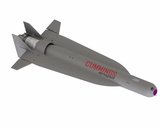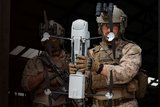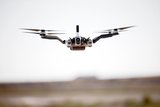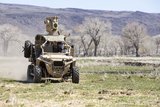UV Europe 2011: UAS ISR hailed as 'critical' to Afghanistan operations
Unmanned systems have been described as 'critical' to ongoing coalition operations in Afghanistan, according to a former Commander of Kandahar Air Field (COMKAF).
Addressing delegates at the UV Europe conference in Brussels, Air Cdre Gordon Moulds of the Royal Air Force's (RAF’s) Air Command described unmanned assets as 'more important than special forces, close-air support (CAS), helicopters and everything else'.
Strongly supportive of former ISAF commander Gen Stanley McChrystal's faith in unmanned systems, Moulds said: 'The number one priority was ISR aircraft. McChrysal got it right!'
Describing how the number of ISR aircraft had been increased from 51 to 105 during his tenure as COMKAF in 2010, Moulds admitted that he still didn't have enough of these assets. 'We would be losing so many people in Afghanistan if it wasn't for the unmanned vehicles we have in theatre. We must keep the innovation going.
'I never realised the utility as to what you could get from them. I took my time to learn and exploit the system,' he continued while describing UAS successes such as IED emplacement identification; indirect fire post-firing tracking; vehicle tracking; insurgent targeting; find and fix of downed manned and unmanned aircraft; and deliberate operations.
'Unmanned vehicles provided good, persistent and synchronous surveillance, easily integrated and fused with other ISR assets. But there were never enough assets and a paucity of SIGINT analysts. Unmanned assets generated too much intelligence,' he admitted.
Moulds also described how persistent ground surveillance systems (PGSS, or aerostats, worked well in collaboration with UAS in order to observe rocket launch locations of insurgents and triggering aircraft to track individuals back to their hideouts. 'What we achieved between UAS and PGSS was superb,' he stressed.
However, Moulds outlined 'airspace issues' and urged industry to come up with improved landing solutions for UAS. During his tour, Moulds said he dealt with 11 crash landings of UAS on the airstrip, one of which closed the runway for 2.5 hours and thereby resulting in the cancellation of 14 CAS missions. 'We have to look at the consequence of [crash landings]. There are big issues with landing,' he concluded.
More from Uncrewed Vehicles
-
![Cummings Aerospace showcases Hellhound loitering munition designed for US Army’s LASSO programme (video)]()
Cummings Aerospace showcases Hellhound loitering munition designed for US Army’s LASSO programme (video)
Cummings Aerospace presented its turbojet-powered Hellhound loitering munition at SOF Week 2025, offering a man-portable solution aligned with the US Army’s LASSO requirements.
-
![SOF Week 2025: PDW unveils attritable FPV drone for SOF operations at scale]()
SOF Week 2025: PDW unveils attritable FPV drone for SOF operations at scale
PDW has revealed its Attritable Multirotor First Person View drone at SOF Week 2025, offering special operations forces a low-cost, rapidly deployable platform for strike and ISR missions, inspired by battlefield lessons from Ukraine.
-
![SOF Week 2025: Teledyne FLIR white paper provides guidance on reusable loitering munitions]()
SOF Week 2025: Teledyne FLIR white paper provides guidance on reusable loitering munitions
Teledyne FLIR is highlighting the emerging requirements for 'recoverable and re-usable' loitering munitions across the contemporary operating environment during this week’s SOF Week conference in Tampa, Florida.
-
![SOF Week 2025: Kraken Technology group debuts K3 Scout USV in North America]()
SOF Week 2025: Kraken Technology group debuts K3 Scout USV in North America
High-performance maritime industry player Kraken Technology Group, based in the UK, has used the SOF Week conference in Tampa, Florida this week to debut its K3 Scout uncrewed surface vessel (USV) to the North American market.
-
![Palladyne AI and Red Cat to demonstrate capabilities for autonomous drone swarms to the US military]()
Palladyne AI and Red Cat to demonstrate capabilities for autonomous drone swarms to the US military
Red Cat and Palladyne AI recently conducted a cross-platform collaborative flight involving three diverse heterogeneous drones.
-
Jammer resistant drone designs spark search for countermeasures
The Russia-Ukraine conflict has driven another stage of evolution for drones and the counter measures to defend against them.

























